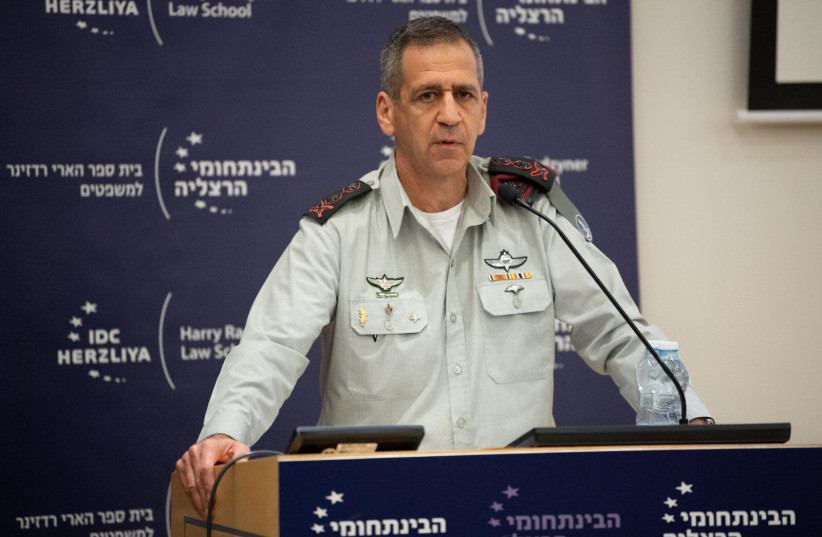Lt.-Gen. Kochavi acknowledges in public for the first time that Israel has struck Iranian targets in Iraq.

The IDF is preparing for a limited confrontation with the Islamic Republic as Israel continues to act against Iranian entrenchment, IDF Chief of Staff Lt.-Gen. Aviv Kochavi warned on Wednesday.
“There is a possibility that we will face a limited confrontation with Iran and we are preparing for it,” Kochavi said at a conference in honor of former IDF chief of staff Lt.-Gen. Amnon Lipkin-Shahak at the IDC Interdisciplinary Center in Herzilya.
“We will continue to act and responsibly,” Israel’s top military officer said, adding it would have been better had Israel not been the only one engaged in the effort to stop Iran.
The IDF, he said, is carrying out operations both publicly and below-the-radar to prevent the enemy from obtaining precision missiles, even if those operations bring about a confrontation.
“We will not allow Iran to entrench itself in Syria, or in Iraq,” Kochavi said, publicly acknowledging for the first time the Israel Air Force has attacked against Iranian targets in Iraq.
“Iraq is undergoing a civil war, when the Quds Force is operating there on a daily basis, when the country itself has turned into an ungoverned area. Advanced weapons are being smuggled by the Quds Force in Iraq on a monthly basis and we can’t allow that,” he said.
According to Kochavi, there’s been a change in threats, with all fronts active in trying to carry out terror or rocket attacks against Israel.
“It wasn’t always like that,” he said, pointing to years of relative quiet from Lebanon and Syria. But over the last few months there were many instances where there were warnings of immediate threats to Israel that the military had to contend with.
And while over the years, Iran was not regarded as an immediate threat, it’s transformed into “an enemy that we can see and that we deal with,” Kochavi said, adding Israel’s “ultimate goal is to instill in our enemies the feeling of despair and doubt in their ability to achieve their aggressive aims.”
According to the chief of staff, Iran is more active in the Middle East against Gulf states, where they are able to strike “without retaliation, without response, without deterrence. But we do respond.”
Iran continues to produce missiles that can reach Israeli territory, Kochavi said, explaining the Iranian military industry is much larger than all the military industries of Israel combined, allowing for them to produce more precise and long-range rockets to threaten the Israeli home front.
In addition, Quds forces in Syria as well as Hezbollah have spectrum barriers and advanced anti-aircraft missiles that can threaten Israeli jets, which nonetheless continue to have freedom of operation across the Middle East.
According to the chief of staff, while war is a solution to be used after all diplomatic solutions have been exhausted, “in the next war, be it with the north or with Gaza, the intensity of enemy firepower will be great.”
“There can be no war without casualties and I cannot not guarantee a short war,” he said. “We will need national resilience.”
“I’m looking at everyone in the eye, it will be intense. We have to prepare for that. We have to prepare for that militarily, on the home front, and mentally,” Kochavi warned.
And in the next war the IDF will strike urban areas belonging to the enemy intensely after warning civilians to leave.
“It’s the enemy that chose that,” he said. “We will strike hard, including the infrastructure of the country that allows the terror group to act against Israel. Know that the responsibility belongs to the government of Lebanon, Syria and Hamas.”
Despite the increased number of threats, none of Israel’s enemies want war, due to the IDF willingness to act, Kochavi stated, adding an opportunity has risen in the south with regard to the Gaza Strip, to improve the humanitarian conditions of civilians.
“I recognize a unique opportunity in Gaza. There is a strong will not to bring about an escalation of tensions on the part of Hamas and it was Islamic Jihad under the leadership of its now-dead commander Bahaa Abu al-Ata that were responsible for the vast majority of attacks on Israel in the past year.”
Hamas, he said, wants to improve the welfare of its citizens and Israel is “in the process of assisting the Egyptians within which we will facilitate civilian relief. This is the policy of the Israeli government and I support it.”
But the opportunity is fragile and it cannot be forgotten that Hamas is still holding the bodies of fallen IDF soldiers Oron Shaul and Hadar Goldin.
“We have to return them home, not just the security concerns of the State of Israel” need to be addressed, he said.
As reported by The Jerusalem Post
